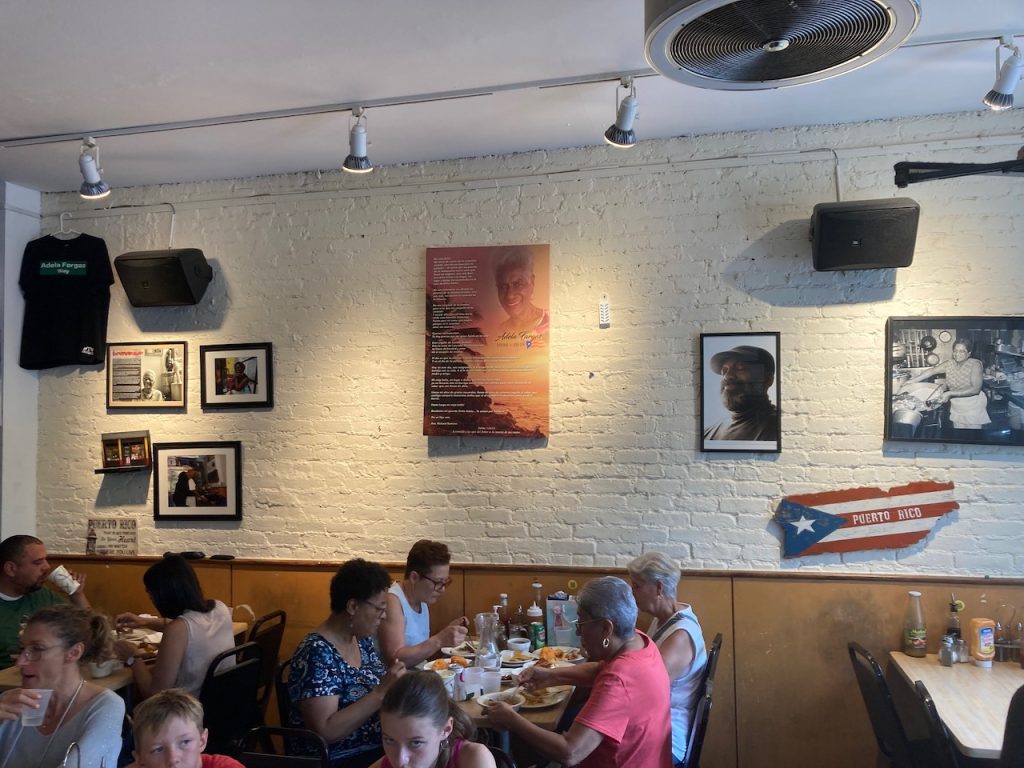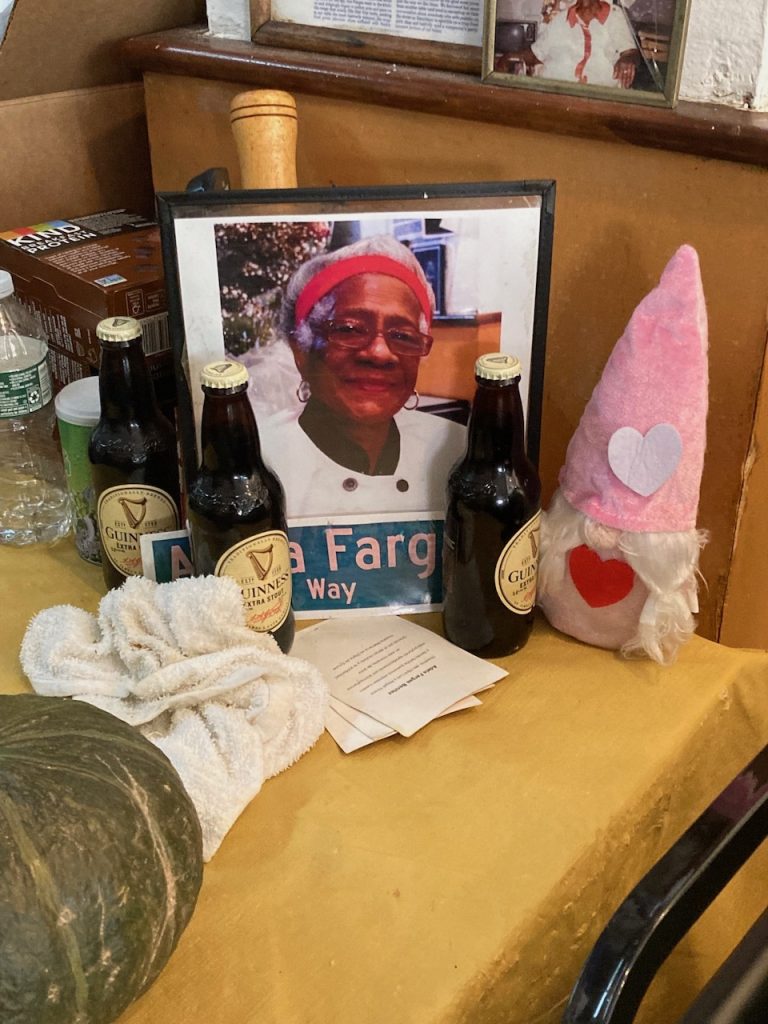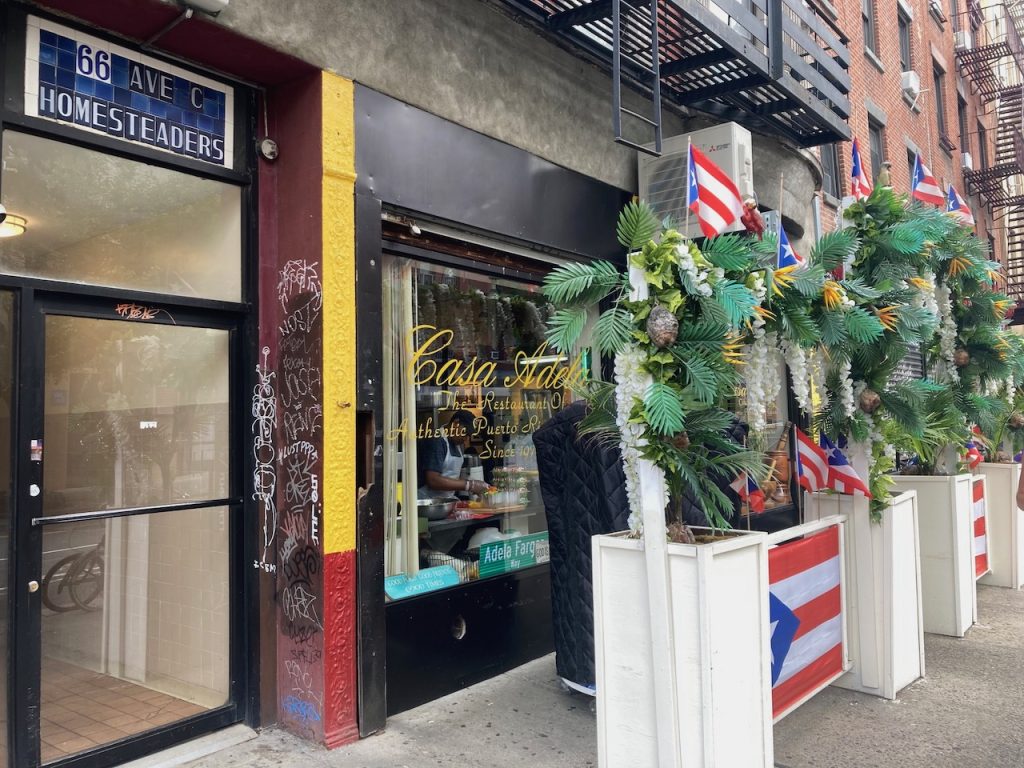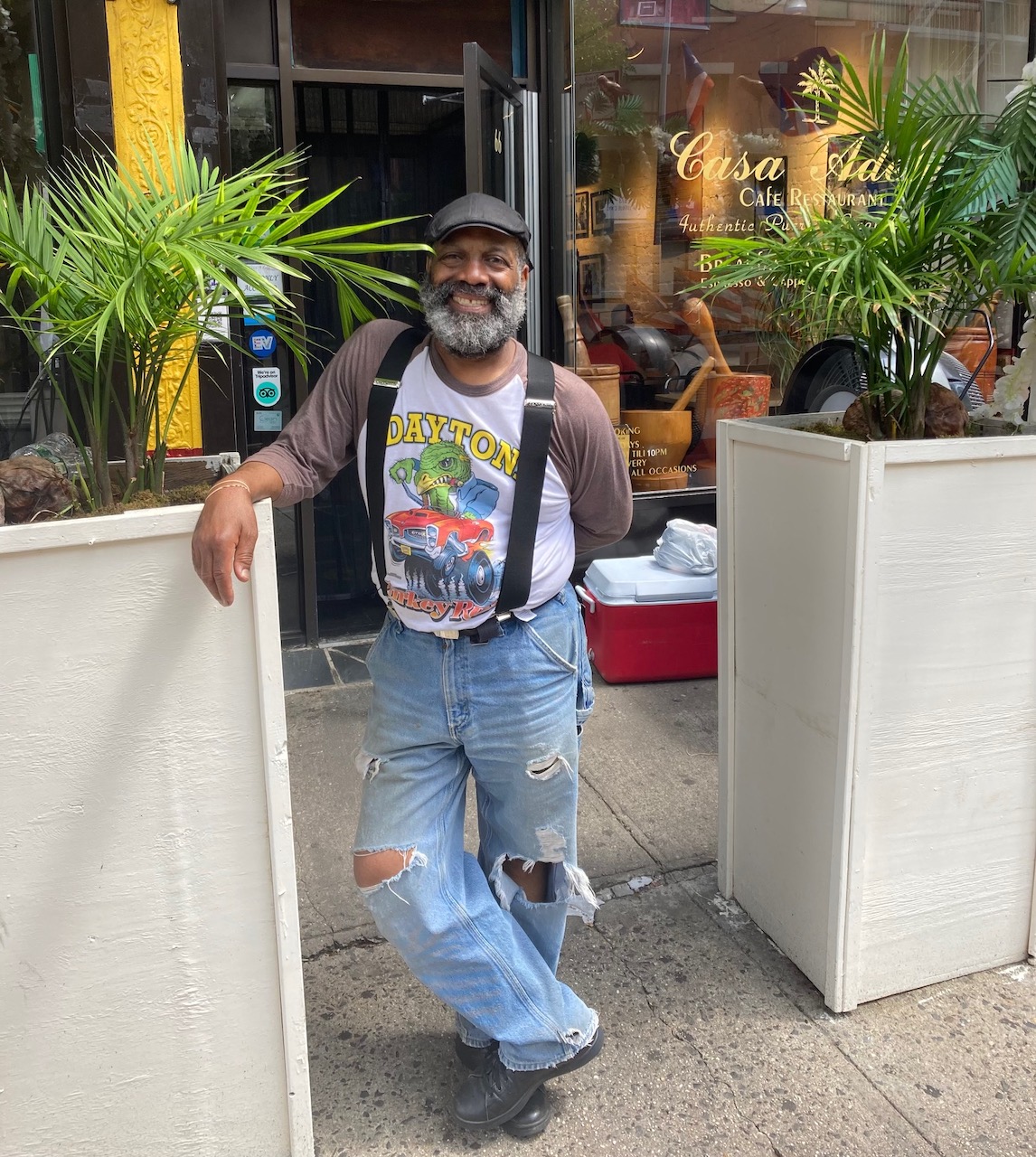BY ALEX EBRAHIMI | Down around Alphabet City, the news breaks in alphabetical disorder. OD’s and DOA’s followed by N.Y.P.D. and NBC, ABC, CBS and ETC means etcetera.
But down where Avenue C’s called Loisaida and the Casa’s called Adela, chaos isn’t the order of the day. It’s rotisserie chicken.
“Excelente! Excelente!” testified one lady just before she left, leaving nothing but bones and cash on the table.
“Take care, mama!” smiled owner Luis Rivera, chewing on ice from a paper coffee cup and sitting across from me at a table by the window.

Above us was his portrait. Wearing that signature flat cap made of wool. He couldn’t say how long he’s had it. Understandably so. Only that the one he was wearing the day we met was made of nylon. Understandably so.
“And when was the picture next to yours taken?” I asked, pointing to the black-and-white photograph of a young Adela Fargas in the kitchen. Smiling as big as the bowl of rice she’s stirring.
“That was at her first restaurant at 58 Avenue C, a couple buildings down from here,” he said.
“Was that also Casa Adela?”
“No,” he laughed, nearly swallowing the ice he was chewing on, then carefully crunching on the punchline: “The place was…Italian named…Caprese Restaurant…I think.”
But she wasn’t tossing pizza dough in the ’70s. The kitchen was Spanish. And the photo is of a woman who had just traded one island for another. The smile is of a seamstress who had just traded the lace of Broadway and Houston Street for the dishes that can be served with rice and beans. Her reputation as a chef came from the lunches she brought to work as a seamstress. The job at the restaurant came from her reputation.
When she got the opportunity to buy the place in installments, payments she never missed, the food she served was the food she was serving back in the factories of Carolina, Puerto Rico. Like the lectors of the old days feeding the workers newspaper stories and books. Only, Adela’s podium was a pushcart. And she was just plain feeding them.
A group of homesteaders, hard at work renovating their building at 66 Avenue C, were the regulars of the original place at 58 Avenue C.
“They were always covered in dirt from all the construction they did,” Luis recalled as he swirled his paper coffee cup of ice all but melted. “My God, I would have to clean the whole place after they left! But I wouldn’t say bad dirt. They gave us the opportunity to rent the location.
“It was a good exchange,” he added as he drank down what was left of the ice.
The job wasn’t full time but he was a full-time son, ever since Adela brought the family over. Leaving wasn’t an option. Neither was the language barrier in New York. He was just a teenager but he knew he had to grow up fast and that meant learning English quickly.

It was no different after graduating high school and joining the Marine Corps down in South Carolina.
“I didn’t last a year,” he told me.
It was the blackout of ’77 and the looting all around Adela gave him a reason to return.
“I told them I was the only male in my household.”
He got an honorable discharge.
By then, Adela had just moved up the block to No. 66 to what became Casa Adela, and Luis soon moved Uptown to go to college and study architecture. The reason was no different: “I wanted to design a restaurant for her,” he said.
“Architecture teaches you about continuity,” he went on. “Teaches you about…squares and circles. Teaches you…24 by 24 is the standard footprint. The equipment you buy can be…24 by 28…24 by 30…but always 24.”
And always Adela. He knew the restaurant needed to be designed because his mother had no formal training. So, it was what Jesus Colon called the University of Life. For Luis, it was the University of Casa Adela. And that’s why…
“College was another unfinished business,” he reflected.
As long as his mother was waking up at 4:30 every morning to prepare pernil asado, the business of Casa Adela was unfinished. The degree that took years and years of studying meant nothing compared to all that needed to be prepped and peeled and chopped.
When the place was opening, he’d run to the market before running from job to job up and down Houston Street. Back then, he worked various jobs in small shops and supermarkets. When the place was closing, he’d clean up and switch off all the burners before cleaning himself up for the Latin dance cafes that always switched on after midnight. On weekends in those days when Adela would be getting up at 4:30, he would be just getting to bed.
But these days at Casa Adela, it’s Luis who starts his days at 4:30 — ending them two to three hours after closing.
“How do you do it?” I asked.
“Well, that’s why I’m chewing the ice. To stay awake,” he said.
“But you overcome. You overcome,” he added, tapping the paper coffee cup against the table, like a gavel.

When Adela died back in 2018, COVID followed like a curse. Luis caught it early on. But he overcame. Just as the restaurant overcame closing for 17 days by delivering soup.
“You can’t lose with a pot of soup,” he noted.
And the restaurant continues to overcome. From the curse of COVID to the hurricane of rent hikes.
These days, you’ll find her shrine by the table in the corner. The Saint of Loisaida smiling like she was all those years ago in the black-and-white picture on the other side of the wall. Flanked by columns of unopened Guinness. Her foamy vice of choice, which she made less bitter by pairing it with, of all things, Clamato.
“To this day, people still bring her Guinness on her birthday,” he said as his wife, Maritza, seated a couple at the table in front of Adela’s shrine.
As the couple toasted plastic cups of water on the rocks, Maritza went from table to table. When she wasn’t jotting down orders, she was serving them.
“How did you meet your wife?” I asked.
“We met in the college cafeteria,” he said…
“Luis!” she called out.
He turned to her.
“You need to move your car,” she told him.
“I need to move my car?” he asked.
She nodded.
“I need to move my car,” he said, as he rose, bringing the paper coffee cup.


Be First to Comment